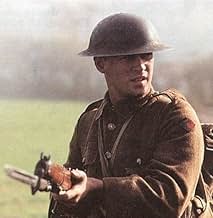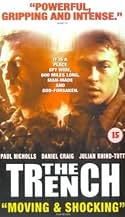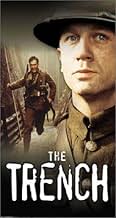AVALIAÇÃO DA IMDb
5,9/10
4,6 mil
SUA AVALIAÇÃO
O Exército Britânico planeja uma grande ofensiva na região do Somme, na França. Acompanhamos um pelotão de soldados britânicos sentados em uma trincheira avançada, aguardando ansiosamente a ... Ler tudoO Exército Britânico planeja uma grande ofensiva na região do Somme, na França. Acompanhamos um pelotão de soldados britânicos sentados em uma trincheira avançada, aguardando ansiosamente a ordem de avançar.O Exército Britânico planeja uma grande ofensiva na região do Somme, na França. Acompanhamos um pelotão de soldados britânicos sentados em uma trincheira avançada, aguardando ansiosamente a ordem de avançar.
- Prêmios
- 2 vitórias e 2 indicações no total
Antony Strachan
- Pte. Horace Beckwith
- (as Anthony Strachan)
Avaliações em destaque
This movie is an unusual type of war movie. 99% of the movie is shot inside of this 8 foot wide, 600 mile long trench, filled with British soldiers just only becoming men. It has a sense of claustistiphobia, and itensity among young men that are practically scared to death about the world around them, and every little thing counts. This movie was very intense, and you couldn't take your eyes off it for a moment. 8.8 out of 10.
Strangely this film has grown on me and I'm not sure why but still have a hate for it. The acting is fairly sound and it has some good moments but there isn't much feel for realism. For a start the trenches would have been infested with rats and lice and from what I've read about The Somme it seemed a lot more draumatic than what was portrayed in this film. It just looked too clean. The main hardship they had experienced was boredom, not relentless rain and the constant madness of bombardments. Also what was the point of capturing a German and then not interrogate him, but give him a fag and then let him go? Another wrong point is that the battalions would have been from the same region. Yeh, I'm being picky but why the scots were with southerners and northerners I don't know. The end of the film is the worst. Surely if there had been nights of endless shelling you'd expect to see some shell holes when going over the top? Could of had a nice picnic on that land. Shame, if the director had read more relevant books it could have been really good.
I am confident that I have never before started a review by complimenting the set designers. Comparing the vintage still photos of soldiers in World War I trenches shown at the beginning of the movie to the trenches in film itself, you can see that somebody with an eye for detail recreated the look of the trench and the costume designers did a good job with the men's uniforms. The bad news is that that is one of this movie's few strong points. For example, the view of no man's land (NML) - the ground between the opposing trenches - shows a green field. It should look like a brown, pock-marked wasteland, which has been captured in many other WW I movies.
The whole effect of "The Trench" is that of a filmed stage play. It could easily be transferred to the stage without losing much and maybe even gaining something. That is to say, the movie is not opened up much. Still, as a WW I buff, I enjoyed it.
The actors are good, and the outline of the story is illustrative of typical situations in the war. However, the specific dialogue might be a little too 1999 rather than 1916. The film does remind us that wars are fought by men who are still boys and concerned about the things young men are obsessed by.
One general situation that jumps out is the promise to the men that they would go into the enemy trenches after bombardment and after previous waves of a British attack and would not encounter any living enemy. (Mopping up, as my WW-II-veteran father called it.) But this was a typical false promise of the strategy used by both sides because the defenders would always cover themselves adequately so a majority would survive the bombardment, and they would almost always be able to get reinforcements into the trenches faster than attackers could make it across NML, and the preliminary bombardment would 1) warn the defenders an attack was coming and 2) chew up the ground making it harder for the attackers to cross, including merely rearranging the barbed wire instead of cutting through it. The result was that being the defender was always advantageous, and being the attacker was always disadvantageous in trench warfare. That's why most of the battle lines on the Western Front remained static for about four years.
I would recommend this movie as worth seeing for world war buffs and Daniel Craig fans, although it likely won't be anyone's favorite movie.
The whole effect of "The Trench" is that of a filmed stage play. It could easily be transferred to the stage without losing much and maybe even gaining something. That is to say, the movie is not opened up much. Still, as a WW I buff, I enjoyed it.
The actors are good, and the outline of the story is illustrative of typical situations in the war. However, the specific dialogue might be a little too 1999 rather than 1916. The film does remind us that wars are fought by men who are still boys and concerned about the things young men are obsessed by.
One general situation that jumps out is the promise to the men that they would go into the enemy trenches after bombardment and after previous waves of a British attack and would not encounter any living enemy. (Mopping up, as my WW-II-veteran father called it.) But this was a typical false promise of the strategy used by both sides because the defenders would always cover themselves adequately so a majority would survive the bombardment, and they would almost always be able to get reinforcements into the trenches faster than attackers could make it across NML, and the preliminary bombardment would 1) warn the defenders an attack was coming and 2) chew up the ground making it harder for the attackers to cross, including merely rearranging the barbed wire instead of cutting through it. The result was that being the defender was always advantageous, and being the attacker was always disadvantageous in trench warfare. That's why most of the battle lines on the Western Front remained static for about four years.
I would recommend this movie as worth seeing for world war buffs and Daniel Craig fans, although it likely won't be anyone's favorite movie.
The focus of "The Trench" obviously is on the human aspects of the British men who have gone to war in World War I. It does a good job of portraying the British soldiers with their emotions, thoughts and trepidations about their circumstances in the trenches of northern France. But it also seems to distort some of the human trappings and demeanors of the time. When movies impose modern mores and culture on the past, they distort that time and its culture and history. Thus, people who don't study such things or have knowledge of the times wind up with an inaccurate notion of history or of the reality of that time.
Two things seem obvious as cultural distortions in this film. The first is the casual, almost disrespectful attitude and unruliness of the soldiers. This isn't something that happens just once or twice, but frequently. While all military throughout history likely has had some humor and playful banter among troops at times, it seems to be more of the rule among this platoon of Brits. The second is in the language. Again, all military throughout history likely has had some use of foul or rough language. But here, it seems that this 1916 platoon of British soldiers has adopted early 21st century British street talk (is it really that vulgar among society in England today?). And, I doubt that the British may always have had more vulgar mouths than we Yanks. But, by the standard of this film, the Brits make the service times of my family, from WW II through Vietnam, seem like baby talk.
There may be any number of other distortions as well. Anthony Strachan, who plays Horace Beckwith, is very good in his role. But I doubt that a man so much over weight would have been conscripted or allowed to join the British Army then, or any time. I knew some men a little over weight at my boot camp, but they were whipped into shape by the end, usually with much less weight to carry around. The men in this film seemed almost constantly to be smoking cigarettes. Cigarette smoking grew immensely during WW I, but it wasn't yet to the point shown in this film among British soldiers. In a long documentary film of WWI that came with the DVD of this movie, I didn't see a single scene of men smoking cigarettes on the French, British and German lines. But, several scenes showed Allied soldiers in the trenches smoking pipes.
The last couple of gross inaccuracies are in the setting. The movie folks did a credible job building the set of trenches – except for one thing. Where is the water and mud? The Allied trenches of WWI were notorious for their foul water and mud, yet we don't see any of that here. And, the scene of the battlefield that the Brits have to charge onto is a lush green meadow. That was almost laughable. Both sides had been bombarding that area for days on end. The land was a desolate wasteland.
The distorted portrayal of the conditions and culture are significant enough to cost this film two stars, so I can rate it no higher than six stars. I base that mostly on the fine performances of the cast – all the actors. The setting of this film was in the days leading up to the first day of the British attack in the Battle of the Somme (July 1 to November 18, 1916). That first day – when this film ends – cost more than 60,000 British soldiers wounded or killed. It's considered the bloodiest slaughter in the history of the British Army.
I mentioned a bonus documentary that came on the DVD with this film. "World War I: On the Western Front" is an excellent lengthy documentary of WWI. It is a CBS News documentary that shows only actual battle film of the French, British and German forces. It is narrated by actor Robert Ryan. That documentary is centered around the Battle of Verdun which cost more than 500,000 lives. It shows scenes all along the Western Front. Men are standing in deep water in the trenches. Men and machines try to move over drenched and muddy roads and fields. And, battlefields between the lines are a no-man's wasteland. Not a blade of grass, flower or tree can be seen. None of that was staged by Hollywood, but Hollywood (in the U.S. and abroad) would do well to study such actual war films to better and more accurately portray scenes in war movies.
Two things seem obvious as cultural distortions in this film. The first is the casual, almost disrespectful attitude and unruliness of the soldiers. This isn't something that happens just once or twice, but frequently. While all military throughout history likely has had some humor and playful banter among troops at times, it seems to be more of the rule among this platoon of Brits. The second is in the language. Again, all military throughout history likely has had some use of foul or rough language. But here, it seems that this 1916 platoon of British soldiers has adopted early 21st century British street talk (is it really that vulgar among society in England today?). And, I doubt that the British may always have had more vulgar mouths than we Yanks. But, by the standard of this film, the Brits make the service times of my family, from WW II through Vietnam, seem like baby talk.
There may be any number of other distortions as well. Anthony Strachan, who plays Horace Beckwith, is very good in his role. But I doubt that a man so much over weight would have been conscripted or allowed to join the British Army then, or any time. I knew some men a little over weight at my boot camp, but they were whipped into shape by the end, usually with much less weight to carry around. The men in this film seemed almost constantly to be smoking cigarettes. Cigarette smoking grew immensely during WW I, but it wasn't yet to the point shown in this film among British soldiers. In a long documentary film of WWI that came with the DVD of this movie, I didn't see a single scene of men smoking cigarettes on the French, British and German lines. But, several scenes showed Allied soldiers in the trenches smoking pipes.
The last couple of gross inaccuracies are in the setting. The movie folks did a credible job building the set of trenches – except for one thing. Where is the water and mud? The Allied trenches of WWI were notorious for their foul water and mud, yet we don't see any of that here. And, the scene of the battlefield that the Brits have to charge onto is a lush green meadow. That was almost laughable. Both sides had been bombarding that area for days on end. The land was a desolate wasteland.
The distorted portrayal of the conditions and culture are significant enough to cost this film two stars, so I can rate it no higher than six stars. I base that mostly on the fine performances of the cast – all the actors. The setting of this film was in the days leading up to the first day of the British attack in the Battle of the Somme (July 1 to November 18, 1916). That first day – when this film ends – cost more than 60,000 British soldiers wounded or killed. It's considered the bloodiest slaughter in the history of the British Army.
I mentioned a bonus documentary that came on the DVD with this film. "World War I: On the Western Front" is an excellent lengthy documentary of WWI. It is a CBS News documentary that shows only actual battle film of the French, British and German forces. It is narrated by actor Robert Ryan. That documentary is centered around the Battle of Verdun which cost more than 500,000 lives. It shows scenes all along the Western Front. Men are standing in deep water in the trenches. Men and machines try to move over drenched and muddy roads and fields. And, battlefields between the lines are a no-man's wasteland. Not a blade of grass, flower or tree can be seen. None of that was staged by Hollywood, but Hollywood (in the U.S. and abroad) would do well to study such actual war films to better and more accurately portray scenes in war movies.
Shot 99.9% INSIDE the trench to convey the sense of claustrophobia. It works. You can almost smell the trench. I personally think that the low budget style produced a happy bi-product rather than it being planned. Not a conventional war movie but a VERY British close up at the inter-personal relationships during WW1 before the Battle of The Somme. The youthful Paul Nicholls eminates a young 'duty to your country soldier' and in the alone-ness he fantasises over the memory of a young girl who merely served him with a stamp at his local post office. Loads of blood and guts and a particularly harrowing scene - almost subliminal - which works well as it ensures your brain remembers the real horrors of war at close quarters inside a trench. The usual chain of command reveals why delegation can sometimes disguise cowardice and fear. The film achieves its objective and portrays the awful waste of life.
Você sabia?
- CuriosidadesIn preparation for the film, Writer and Director William Boyd sent the main cast to a replica trench for a night, to experience the conditions the British Army suffered.
- Erros de gravaçãoThe shelling of German trenches and the nomansland before the actual attack was immense. First of all the shelling would have been deafening, secondly, the nomansland would have been a moon-like scenery full of craters and barbwire, not a nice meadow.
- Citações
Pte. Charlie Ambrose: [in a mocking whine] You can tell your grandchildren, I was wounded by a flyin' tooth.
[everyone laughs]
- ConexõesFeatured in Being James Bond (2021)
Principais escolhas
Faça login para avaliar e ver a lista de recomendações personalizadas
- How long is The Trench?Fornecido pela Alexa
Detalhes
- Data de lançamento
- Países de origem
- Idiomas
- Também conhecido como
- La trinchera
- Locações de filme
- Empresas de produção
- Consulte mais créditos da empresa na IMDbPro
- Tempo de duração1 hora 38 minutos
- Cor
- Mixagem de som
- Proporção
- 1.85 : 1
Contribua para esta página
Sugerir uma alteração ou adicionar conteúdo ausente


































